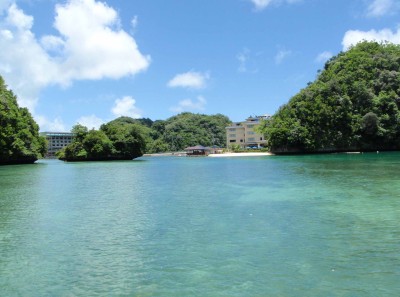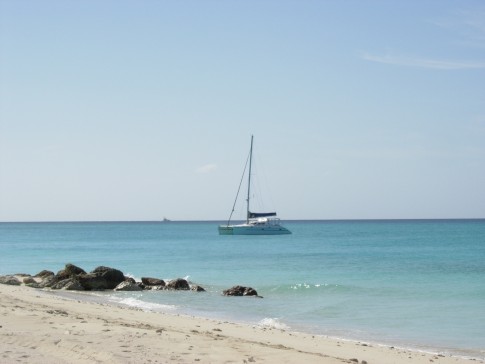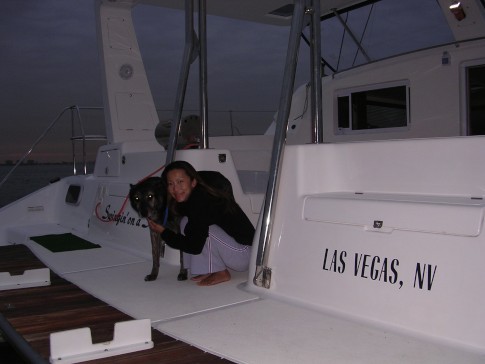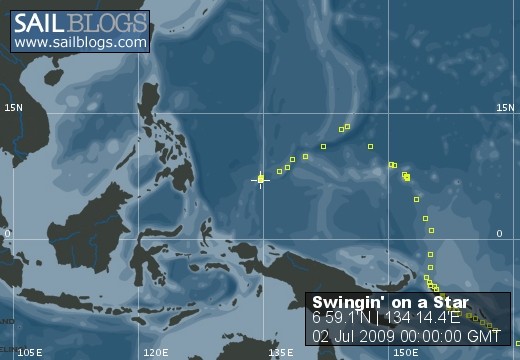
Swingin' on a Star
Ship's log for the circumnavigating Saint Francis 50 catamaran, "Swingin on a Star".
01 April 2010 | Palau
13 July 2009 | Palau
05 July 2009 | Yacht Harbor
03 July 2009 | Peleliu
02 July 2009 | Palau
01 July 2009 | Two Dog Beach
30 June 2009 | Mecharchar
29 June 2009 | Mecharchar
28 June 2009 | Ulong
27 June 2009 | Ngeruktabel
17 June 2009 | Ngeruktabel
16 June 2009 | Ngeruktabel
15 June 2009 | Ngeruktabel
14 June 2009 | Ngeruktabel
13 June 2009 | Ngerutable
25 May 2009 | Yacht Harbor
30 April 2009 | Malakal
29 April 2009 | Koror
28 April 2009 | Malakal
27 April 2009 | Malakal
Etpison Museum
04 April 2009 | Koror
Randy

We visited the private Etpison Museum in Koror today. The museum has a nice collection of exhibits and a great gift shop. It has been very interesting to look through the museums here and combine that with the experiences we have had interacting with people. Palau is one of our favorite places in the Pacific islands and partly because of its people.
Palauans are kind but retiring, relaxed but responsive and very proud of their culture. They celebrate First Child Birth, Homebuilding, and Death, much like the rest of the world but they do it in a very Palauan way. It is a deep and intriguing culture.
Like many developing nations the cultural heritage stands in stark contrast to the modern governance and commercial pressures. The country is in some fairly concerning economic straights at present and they are now spending the principal in the trust set out by the US and other nations. Previously only the interest was spent but with the decline in returns globally and increased spending, the interest isn't enough.
Another problem is the fact that 62% of the population is employed by the government. Stop and think about that for a second. The government does not generate one cent in revenue through commerce, only internal/external taxes and foreign subsidies. This means that 62% of the population is basically on foreign welfare.
You could argue that Palau is owed compensation for the foreign war fought on its soil. WWII was over 60 years ago however, and the country has more infrastructure than they have ever had, all of the jungle has returned to Peleliu and other areas, there are money making WWII tourist sites everywhere, and there's the 700 million in the trust, not to mention millions in other aid and support from the US, Japan, Taiwan, the EU, the UN and other donors.
There's a sizable oil potential in Palau. The structure of the federal and state governments makes proceeding complex to say the least. There are 16 state governments and one national government plus a traditional chieftain government in Palau.
The traditional government was originally integrated with the elected government as a way to protect Palauan customs and heritage for the general populace. This traditional government has sadly been marginalized for the most part. That said there are still 17 government units, each with a legislature and executive branch, for a country smaller than the smallest state in the United States.
The story of Palau is similar to the stories of so many small island nations in the Pacific. They want to live in the way they have become accustomed under colonial rule but don't want to be under colonial rule. In an attempt to transition matters, the prior administrator typically infuses large (relatively) sums of capital to ease the evolution. This capital often breeds greed and corruption in a culture with no tools to deal with such a windfall.
Land ownership is also a big problem. Many islands had no concept of land ownership, or at least nothing like individual land ownership. The people of the clan own the land until a stronger clan takes it by force or coercion. The concept of selling land has create tremendous problems within nations and even families in the islands. In the end you have an interesting situation that requires much work to become sustainable and responsible.
Palau is not perfect but it is certainly an example for many other island nations from an infrastructure standpoint. Some of this has to do with the ratio of aid to population. Palau has received over 852 million USD in support since 1995. There are 20,000 people in Palau. That's over 42,600 per person.
It should be noted that only 14,000 of the residents are Palauan, the contribution is thus $4,285 per Palauan per year. Palauans have a different status than non Palauans. The minimum wage here is $2.50 per hour, but it only applies to Palauans. That means you can pay any of the more than 5,000 Philippinos here $150 a month, which is a common rate. The argument for this is that they are much better off than they would be in the slums of Manila. I can't disagree with that but the fabrication of different rules for different people has some unpleasant names.
Only Palauans can vote. Only Palauans can own property. Only Palauans can run businesses, though partnerships are allowed. Only those born of Palauans can be Palauan. One notable senator of Palauan and Chammoro (i.e. Marianas Islands) descent regularly demands eviction of non Palauans who get in his way.
The compact with the US specifies equal treatment both ways. Palauans can move to the US, buy a house, work anywhere and become citizens and vote if they like. Not so the other way around.
So like everywhere there are problems. That said, Palau is a breath of fresh air compared to Chuuk, PNG or the Solomon Islands. The government has real problems but it is far more responsible than some of its neighbors. Tourism is strong but under control and aware of the importance of the preservation of the natural resources. The country has managed to arrange good roads and bridges through the USA and Japan in exchange for permission to house military in a crisis, and as a token of peace and friendship, respectively. Violent crime is almost unheard of.
Everyone uses cars and outboards as opposed to feet and paddles, not sure if this is a good thing but it is certainly a status symbol. All of the Palauans have power, phone, internet and cable TV in their homes as well.
So when you are in Palau you will not see Urbanity but there's enough to keep you grounded in the modern world and the natural world at the same time. It is a fantastically beautiful place that still feels like a distant corner of the USA.
For more on the soon to expire compact see:
http://www.gao.gov/products/GAO-08-858T
Palauans are kind but retiring, relaxed but responsive and very proud of their culture. They celebrate First Child Birth, Homebuilding, and Death, much like the rest of the world but they do it in a very Palauan way. It is a deep and intriguing culture.
Like many developing nations the cultural heritage stands in stark contrast to the modern governance and commercial pressures. The country is in some fairly concerning economic straights at present and they are now spending the principal in the trust set out by the US and other nations. Previously only the interest was spent but with the decline in returns globally and increased spending, the interest isn't enough.
Another problem is the fact that 62% of the population is employed by the government. Stop and think about that for a second. The government does not generate one cent in revenue through commerce, only internal/external taxes and foreign subsidies. This means that 62% of the population is basically on foreign welfare.
You could argue that Palau is owed compensation for the foreign war fought on its soil. WWII was over 60 years ago however, and the country has more infrastructure than they have ever had, all of the jungle has returned to Peleliu and other areas, there are money making WWII tourist sites everywhere, and there's the 700 million in the trust, not to mention millions in other aid and support from the US, Japan, Taiwan, the EU, the UN and other donors.
There's a sizable oil potential in Palau. The structure of the federal and state governments makes proceeding complex to say the least. There are 16 state governments and one national government plus a traditional chieftain government in Palau.
The traditional government was originally integrated with the elected government as a way to protect Palauan customs and heritage for the general populace. This traditional government has sadly been marginalized for the most part. That said there are still 17 government units, each with a legislature and executive branch, for a country smaller than the smallest state in the United States.
The story of Palau is similar to the stories of so many small island nations in the Pacific. They want to live in the way they have become accustomed under colonial rule but don't want to be under colonial rule. In an attempt to transition matters, the prior administrator typically infuses large (relatively) sums of capital to ease the evolution. This capital often breeds greed and corruption in a culture with no tools to deal with such a windfall.
Land ownership is also a big problem. Many islands had no concept of land ownership, or at least nothing like individual land ownership. The people of the clan own the land until a stronger clan takes it by force or coercion. The concept of selling land has create tremendous problems within nations and even families in the islands. In the end you have an interesting situation that requires much work to become sustainable and responsible.
Palau is not perfect but it is certainly an example for many other island nations from an infrastructure standpoint. Some of this has to do with the ratio of aid to population. Palau has received over 852 million USD in support since 1995. There are 20,000 people in Palau. That's over 42,600 per person.
It should be noted that only 14,000 of the residents are Palauan, the contribution is thus $4,285 per Palauan per year. Palauans have a different status than non Palauans. The minimum wage here is $2.50 per hour, but it only applies to Palauans. That means you can pay any of the more than 5,000 Philippinos here $150 a month, which is a common rate. The argument for this is that they are much better off than they would be in the slums of Manila. I can't disagree with that but the fabrication of different rules for different people has some unpleasant names.
Only Palauans can vote. Only Palauans can own property. Only Palauans can run businesses, though partnerships are allowed. Only those born of Palauans can be Palauan. One notable senator of Palauan and Chammoro (i.e. Marianas Islands) descent regularly demands eviction of non Palauans who get in his way.
The compact with the US specifies equal treatment both ways. Palauans can move to the US, buy a house, work anywhere and become citizens and vote if they like. Not so the other way around.
So like everywhere there are problems. That said, Palau is a breath of fresh air compared to Chuuk, PNG or the Solomon Islands. The government has real problems but it is far more responsible than some of its neighbors. Tourism is strong but under control and aware of the importance of the preservation of the natural resources. The country has managed to arrange good roads and bridges through the USA and Japan in exchange for permission to house military in a crisis, and as a token of peace and friendship, respectively. Violent crime is almost unheard of.
Everyone uses cars and outboards as opposed to feet and paddles, not sure if this is a good thing but it is certainly a status symbol. All of the Palauans have power, phone, internet and cable TV in their homes as well.
So when you are in Palau you will not see Urbanity but there's enough to keep you grounded in the modern world and the natural world at the same time. It is a fantastically beautiful place that still feels like a distant corner of the USA.
For more on the soon to expire compact see:
http://www.gao.gov/products/GAO-08-858T
Comments
| Vessel Name: | Swingin' on a Star |
| Vessel Make/Model: | Saint Francis 50 |
| Hailing Port: | Las Vegas, NV |
| Crew: | Randy Abernethy |
| Home Page: | http://swinginonastar.com |
Swingin on a Star

Who: Randy Abernethy
Port: Las Vegas, NV






